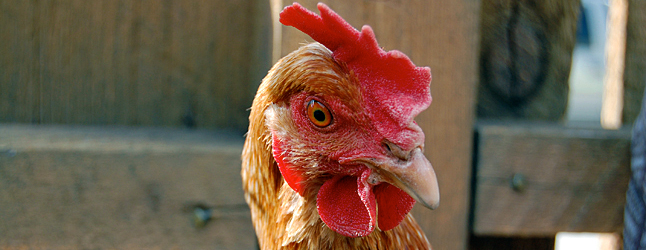
Three were four negative comments about urban chickens submitted to the Public Hearing held immediately before the regular August 25 Council meeting. Revelstoke Current file photo
By David F. Rooney
It’s too bad no one thought to bring a couple of hens to Tuesday’s Council meeting. Then Mayor Mark McKee and members of Council might have been able to see how sweet-natured and quiet most hens are.
Council was considering Bylaw 2067, an amendment to two existing bylaws Nos. 1264 and 2984, that would permit the installation of electrified fencing “within a fenced portion of a property that has an existing non-electrified fence that forms a continuous enclosure around the electric fencing to prevent wildlife from accessing backyard hens. The amendment specifies that:
- (i) The electric fence shall be programmed to a maximum conduction of 9,000 volts and must be a CSA approved unit.
- (ii) The height of the electric fence must be lower than the non- electrified fence portion of the property.”
Three were four negative comments about urban chickens submitted to the Public Hearing held immediately before the regular August 25 Council meeting. Two of the comments were contained in e-mails and two were from ladies who attended the hearing. There were two proponents.
“As the zoning amendment bylaw is also proposing to amend Schedule “B” to include Backyard Hen Keeping as defined in the Animal Control Bylaw, I would like to see more detailed specifications for the Hen Enclosure fenced area in the Animal Control Bylaw. The proposed definition for Hen Enclosure currently states ‘means an outdoor area that is fenced in to prevent hens from wandering and predators from entering.’ This definition can be interpreted in different ways. I suggest the height and kind of fence be outlined i.e. a minimum height of 5 feet and a solid fence so that neighbouring properties do not have to sit out and look at hen coops/enclosures.”
Please click here to read their e-mails.
Geri Schleiss was also opposed to any effort to permit chicken-raising within in the city.
“I am opposed to backyard chickens,” she said. “Number One, I believe they will attract rodents, bears and coyotes. You might be able to put up an electric fence that will deter them (bears and coyotes).” However, an electric fence will not stop rodents such as mice or rats.
Joan Maskell told Council she agreed with Geri’s views but otherwise declined to speak.
Melissa Hemphill was one of two people who clearly stood up for chickens. She noted that Revelstoke’s Food Charter and the Food Security Strategy support the notion of urban chicken-keeping. It is also supported by the North Columbia Environmental Society and Local Food Initiative, she said.
Michael Brooks-Hill said he believes that people should be allowed to keep chickens in town and that it will help people become more self-sufficient, food-wise. Any neighbourhood disagreements about someone keeping chickens can be worked out, he said.
The only other person to comment was Francis Maltby who said, rather inscrutably: “Chickens yes; meadows, no,” an allusion perhaps to his recent conflict with some of his neighbours — and the City — over his landscaping efforts. Bear Aware Coordinator Sue Davies was present for the public hearing but declined to speak.
McKee thanked everyone for their comments and assured them that their thoughts will form part of the record as Council decides what to do.
Please activate the YouTube player below to watch the public hearing. It begins at the 14-second mark and ends at the 9:28-minute point.



